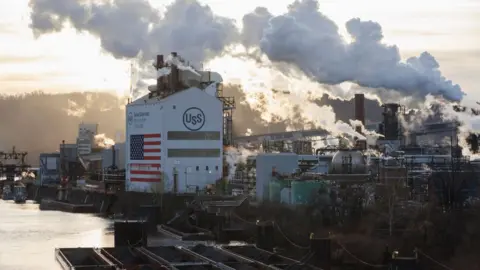Biden blocks Japan’s Nippon Steel from buying US Steel
 Getty Images
Getty ImagesU.S. President Joe Biden has formally blocked a larger Japanese company from acquiring U.S. Steel, saying foreign ownership could pose a risk to national security.
The controversial decision comes a year after Nippon Steel first announced the $14.9bn (£12bn) dealdescribing it as a lifeline to its smaller rivals based in Pennsylvania.
But the deal ran into trouble almost immediately as United Steelworkers leaders fiercely opposed the deal, putting political pressure on a key state during the 2024 presidential election.
Biden ultimately decided to scrap the deal despite concerns from some advisers that it could damage Washington’s relationship with key ally Tokyo.
Nippon Steel and U.S. Steel, which have previously threatened to sue the government if the deal doesn’t go through, accused Biden on Friday of manipulating reviews of the deal for political gain.
They said they would take “appropriate action to protect their legal rights.”
“We believe President Biden is sacrificing the future of American steelworkers for his own political agenda,” the companies said in a statement, adding that the move “raises the bar for any company headquartered in a U.S. ally considering a move in the steel sector.” Companies with major investments send a chilling message.” USA”.
Biden’s decision raises major questions about the path forward for U.S. Steel, a 124-year-old company that was once a symbol of American industrial strength but is now greatly weakened.
It spent months searching for a buyer before announcing a partnership with Nippon Steel, the world’s fourth-largest steelmaker.
In the months since the announcement, the companies have vowed not to cut jobs and made other concessions to win support.
Just this week, they offered to fund a workforce training center – and give the government the power to veto potential production cuts, according to reports.
U.S. Steel has also warned that without investment from a new owner it may have to close the plant, concerns echoed by some workers and local politicians.
Other business groups said they fear rejecting the deal could scare away international investors at a time of rising U.S. protectionism.
But those arguments failed to convince Biden, who spoke out against the deal early last year.
The deal also drew criticism from President-elect Donald Trump and incoming Vice President J.D. Vance.
A U.S. government panel tasked with reviewing the deal’s national security risks failed to reach consensus in late December, ultimately handing the decision over to Biden, who was given a 15-day deadline to act.
Maintaining U.S. ownership is important to keeping the U.S. steel industry and its supply chain strong, he said in a statement on Friday.
“As I’ve said many times, steel production and the workers who make it are the backbone of our country,” he said.
“That’s because steel powers our country: our infrastructure, our auto industry and our defense industrial base. Without domestic steel production and domestic steel workers, our country is less strong and more Not safe.”
The United Steelworkers called the decision “the right move for our members and our national security” and said its opposition was motivated by concerns about the long-term viability of its industry.
“We thank President Biden for his willingness to take bold action to maintain a strong domestic steel industry and for his lifelong commitment to American workers,” said President David McCaul.
Shares of U.S. Steel fell about 5% in early trading Friday.
But Pangea Policy’s Terry Haynes said he didn’t think the move necessarily marked the end of the deal.
“One of the difficulties with this decision is that Japan is a very close ally of the United States,” he said. “Frankly, the administration has a huge evidentiary burden to justify what they did today — and that harms the bilateral relationship with Japan, which is what Trump wants to avoid.”
Professor Stephen Nagy of the Department of Political International Studies at Tokyo International Christian University also said he thinks the companies may decide to try again under Trump, possibly offering different terms that the new president claims he negotiated A better deal. trade.
He called Biden’s decision “political” and noted the administration’s commitment from the beginning to a foreign policy “for the middle class.”
“This is a direct response and continuation of Trump’s ‘Make America Great Again’ agenda,” he said.
“The Biden administration cannot afford to appear weak before foreign businesses, whether allies or adversaries.”



